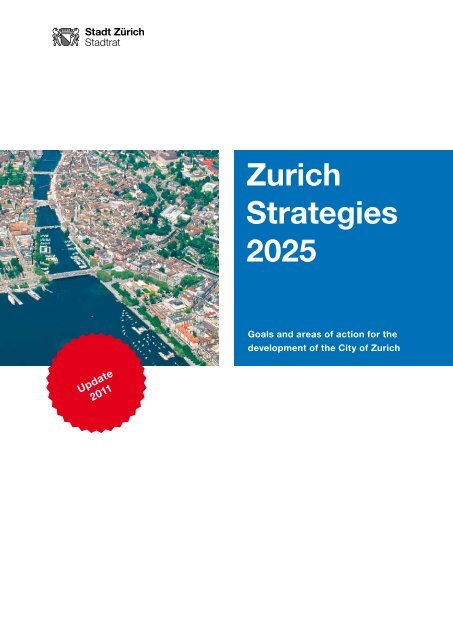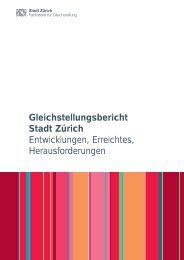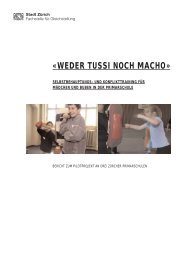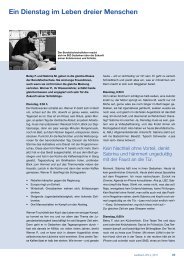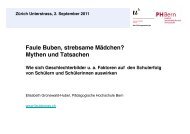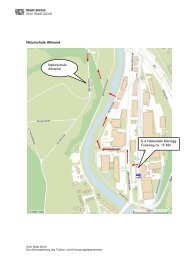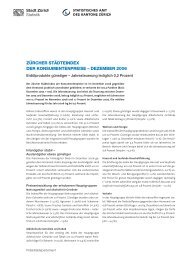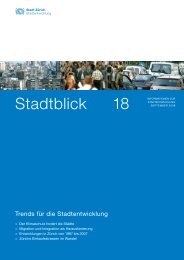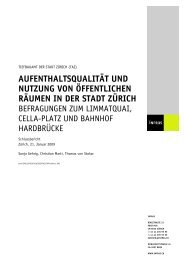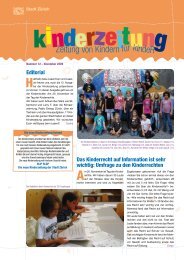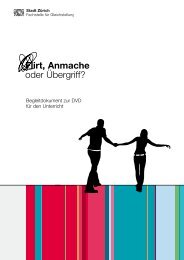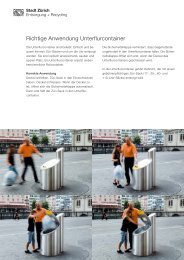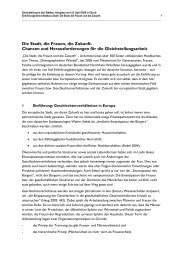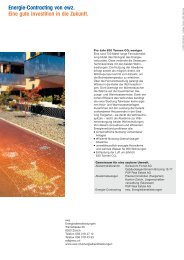Zürich Strategies 2025 (PDF, 52 Pages, 2 MB - Stadt Zürich
Zürich Strategies 2025 (PDF, 52 Pages, 2 MB - Stadt Zürich
Zürich Strategies 2025 (PDF, 52 Pages, 2 MB - Stadt Zürich
Create successful ePaper yourself
Turn your PDF publications into a flip-book with our unique Google optimized e-Paper software.
Update<br />
2011<br />
Zurich<br />
<strong>Strategies</strong><br />
<strong>2025</strong><br />
Goals and areas of action for the<br />
development of the City of Zurich
Contents<br />
Zurich <strong>Strategies</strong> <strong>2025</strong> 3<br />
Challenges 4<br />
Vision 7<br />
What will we live on today and tomorrow? 9<br />
01 Expansion of the knowledge and research centre 10<br />
02 Good general conditions for the financial sector 12<br />
03 Fertile soil for the creative industries 14<br />
04 Promotion of life sciences and university medicine 16<br />
05 Space for sustainable industrial and commercial businesses 18<br />
06 Promoting Zurich as a destination 20<br />
How do we maintain our quality of life? 23<br />
07 Promotion of a cosmopolitan and international spirit 24<br />
08 Promotion of good co-existence 26<br />
09 Outstanding educational opportunities at all levels 28<br />
10 Development of a diverse residential city 30<br />
11 Structural development and maintenance of urban and natural space 32<br />
12 Development of a wide range of cultural, leisure and sport offers 34<br />
13 Planning for city-friendly mobility 36<br />
14 Good environmental quality and sustainable energy supply 38<br />
15 An efficient and secure infrastructure 40<br />
16 Promotion of health and an integrated health care 42<br />
How do we organise ourselves? 45<br />
17 Working together as partners, also across borders 46<br />
18 An efficient and quality-conscious City Administration 48
<strong>Strategies</strong> for Zurich<br />
The City of Zurich has developed successfully in recent years. This progress has been<br />
aided by an economic situation that has proved to be relatively healthy, despite the global<br />
crisis and also by the implementation of the major strategies and programmes of the City<br />
– such as those regarding housing, mobility, public transport, culture and the improvement<br />
of public space.<br />
It is not self-evident that this successful development of the city will be continued in the<br />
future. In order to pave the way into a still uncertain future, the City Council published<br />
Zurich <strong>Strategies</strong> <strong>2025</strong> in 2007. The strategies cover a longer period than the four-year<br />
goals of the City Council and form the basis of the Spatial Development Strategy RES<br />
paper.<br />
Higher-level strategies of this kind are necessary in order to be able to coordinate<br />
solutions for the challenges of the future and to position Zurich as a internationally<br />
important city over the long term. These strategies must be periodically checked,<br />
however, because the framework conditions can change. With this in mind, the City<br />
Council is now presenting an updated version of the paper formulated in 2007.<br />
Three questions were of primary importance in the formulation and updating of Zurich<br />
<strong>Strategies</strong> <strong>2025</strong>:<br />
� What will we live on today and tomorrow?<br />
� How do we maintain our quality of life?<br />
� How do we organise ourselves?<br />
Together with the Administration - and within the context of a broad evaluation - the<br />
City Council of Zurich has looked for answers to these questions and has developed<br />
corresponding strategies, which should ensure that the City is well equipped to meet<br />
the challenges of the future; the aim is to develop existing strengths further, to eliminate<br />
weaknesses and to guard against risks.<br />
The City Council will be very pleased if Zurich <strong>Strategies</strong> <strong>2025</strong> stimulates detailed<br />
discussions about the development of our City.<br />
The City Council of Zurich<br />
February 2011<br />
3
4<br />
Challenges<br />
Today, Zurich is a prosperous city whose qualities are recognised far and wide. Continued<br />
successful development of the City is not a given, however, because of a wide range of<br />
challenges. It is certainly true that global problems such as migration, climate change,<br />
limited natural resources or terrorism must first be addressed at international level, but local<br />
early-warning systems and measures are also necessary in terms of «thinking globally –<br />
acting locally». Every city faces its own specific challenges, which can be tackled only<br />
locally, and dealing with them can uncover opportunities for innovation .<br />
Scenarios for the possible development of the City were first drafted when the strategy<br />
paper of 2007 was being drawn up. These scenarios indicated desirable development<br />
perspectives, as well as those to be avoided, and helped to identify the major challenges for<br />
Zurich.<br />
According to the current level of awareness, Zurich will be primarily faced with the following<br />
challenges in the next few years:<br />
� Changing economic conditions<br />
With tax revenue difficult to calculate in advance, how can an adequate financial budget be<br />
ensured, one that will enable the continued financing of infrastructure, social services,<br />
security and education at today's level of quality ?<br />
� Limited environmental and energy resources, and a shortage of space<br />
How can a sustainable approach to the environment, energy and other limited resources be<br />
found? What challenges are presented by the increased inward densification that will<br />
become increasingly necessary due to lack of space?<br />
� Accentuated competition between cities<br />
How can Zurich survive as a global city in the face of the competition between cities, which<br />
will be accentuated by the increasing globalisation and transnational mobility?<br />
� Demographic change, social trends towards segregation and individualisation,<br />
as well as immigration<br />
How can Zurich guarantee social cohesion in an urban society in terms of an integration of<br />
different social and ethnic groups and the interplay of generations?
� Technological change and a growing knowledge economy<br />
How can Zurich make creative use of technological change in order to react to changing<br />
requirements in the workplace? And how can the City ensure a wide range of job opportunities?<br />
� Working together in the agglomeration and a constricting federalism<br />
How should Zurich deal with the often restrictive federal framework? How can Zurich<br />
strengthen the position of cities in Switzerland – and contribute towards a balanced distribution<br />
of tasks, powers and burdens between different levels of government?<br />
� Increasing regulatory burdens<br />
How should Zurich deal with higher security and quality demands without increasing<br />
regulatory density and complexity of approval procedures, without impairing the innovative<br />
capacity and flexibility of the location of Zurich?<br />
� 24-hour city<br />
How can Zurich remain attractive as a leisure city while still protecting the interests of the<br />
residents? How can the increasing demand of resources be met to handle sanitation,<br />
mobility and security?<br />
5
Vision: Zurich - a sustainable and successful major city<br />
In the year <strong>2025</strong>, Zurich will be …<br />
... a city located in an attractive landscape with carefully maintained<br />
natural and urban qualities<br />
... a city with a high standard of living, excellent cultural and<br />
infrastructural facilities and good environmental conditions<br />
... a cosmopolitan and tolerant city, even beyond its own borders<br />
... a vibrant urban centre and a diverse residential city with<br />
a well mixed population<br />
... an important international financial centre and an innovative science<br />
and business location<br />
... the site of a labour market that offers plenty of jobs for people<br />
with different qualifications<br />
... a city with sustainable and affordable social networks<br />
… a city that makes use of the diversity of its inhabitants to<br />
shape their common future<br />
… a living space in which the population feels safe and takes an active<br />
part in social life<br />
... a city with excellent public transport, attractive pedestrian areas and<br />
bicycle paths and optimised traffic management<br />
... a responsible and exemplary city with regard to social, ecological and<br />
energy policies with the goal of achieving the 2000-Watt-Society<br />
... a strong partner for its surrounding municipalities and for Switzerland<br />
7<br />
7
What will we<br />
live on today<br />
and tomorrow?<br />
The City of Zurich needs financial resources to be able to make a commit-<br />
ment towards quality of life and social cohesion.<br />
Competitive companies and economic prosperity create the corresponding<br />
preconditions, because companies generate the basis for necessary<br />
investment through their taxes and the jobs they create.<br />
The City therefore promotes promising sectors and ensures the timely<br />
urban planning. It does this in the knowledge that solid basic economic<br />
structures and well-developed education, social and health facilities play<br />
an important role in the international competition between cities.<br />
9
01<br />
10<br />
Expansion of the knowledge and research centre<br />
Initial situation<br />
With the Swiss Federal Institute of Technology (ETH Zurich 2010: European ranking 4, world<br />
ranking 23) and the University (2010: European ranking 12, world ranking 51), Zurich has two<br />
internationally renowned universities, which are of great importance to the location; they<br />
have produced 27 Nobel Prize winners up to now. With their research and development<br />
programmes, the Universities of Applied Sciences also contribute to Zurich's reputation as<br />
one of the most important science and research locations.<br />
In view of international competition, recruiting the best specialists for the science and<br />
research location remains a challenge for Zurich, with its around 58,000 students.<br />
<strong>Strategies</strong><br />
� The City promotes the transfer of technology from the universities to practice (spinoffs),<br />
above all in the areas of life sciences, ICT and Cleantech (see Action Area 05).<br />
� The City provides planning support for the structural development of the universities in<br />
its home district and in the various external locations, as well as the presence of the<br />
universities in the overall view of the city.<br />
� The City ensures that the different university locations are well connected through its<br />
public transport system, pedestrian areas and bicycle paths.<br />
� The City is building up the conference infrastructure for improved international exchange<br />
in the fields of science and research.<br />
� The City cooperates with specialised housing foundations in order to provide sufficient<br />
affordable housing for students and doctoral candidates.
Leading projects and plans<br />
– Support for the Climate-KIC Initiative (Climate Knowledge & Innovation Community),<br />
which is financed by the EU and in which ETH Zurich is heavily involved<br />
– Implementation of the cantonal Hochschulquartier Master Plan (location concentration<br />
and new buildings in the centre)<br />
– Support for the Energy Efficiency and Renewable Energies research area through the<br />
Electricity Service Zurich (ewz)<br />
– Support for the further development of the ETH campus Science City<br />
– Participation in Strategic Development Planning USZ UZH ETH for a new University<br />
Hospital (see Action Area 04)<br />
– Realisation of a new Zurich Congress Centre (see Action Area 06)<br />
11
02<br />
12<br />
Good general conditions for the financial sector<br />
Initial situation<br />
Zurich is a global financial centre. In addition to the banks and insurances, company-related<br />
services with different job profiles characterise the Zurich location.<br />
The financial sector is of crucial importance to the economy of the city of Zurich,<br />
because it generates around one third of the Economic Value Added and employs one-fifth<br />
of all workers. It is expected that the financial sector will generate up to 75 percent of the<br />
taxes from legal entities. However, in view of its importance, its volatility represents a great<br />
challenge.<br />
The financial sector currently finds itself in a state of transition due to the international financial<br />
crisis. But from the international point of view, the situation in Zurich is relatively good,<br />
however; by means of strict framework conditions, the national financial policy ensures that<br />
high quality financial services will continue to be provided in Switzerland in the future<br />
through an industry that provides a high Economic Value Added.<br />
<strong>Strategies</strong><br />
� Together with the Canton of Zurich, the City works to ensure good internal and<br />
external conditions, so that the financial sector can remain efficient and reliable.<br />
� In its relations with the Federal government, the City promotes a transparent financial<br />
sector with a long-term perspective.<br />
� Together with the Canton of Zurich, the City continues to pursue the Cluster Strategy<br />
for Financial Services.
Leading projects and initiatives<br />
– Continued projects within the context of the Cluster Strategy for the Financial Sector,<br />
including, among others, the Zurich Financial Centre Website and a data monitoring,<br />
together with the Canton of Zurich, the Zurich Bank Association and other partners<br />
– Regular exchanges between the City, the financial centre, the Canton of Zurich and the<br />
Confederation<br />
13
03<br />
14<br />
Fertile soil for the creative industries<br />
Initial situation<br />
With the third Creative Report of 2010, the City of Zurich confirmed its leading role in<br />
Switzerland in this area. With approximately 33,000 employees, the creative industries in<br />
Zurich achieved a turnover of 14 billion in 2008 and a gross Economic Value Added of 3.3<br />
billion Swiss Francs. Between 2005 and 2008 the employment rate increase by 18 percent<br />
in this sector.<br />
The creative economy includes all profit-oriented cultural and creative entities from the<br />
following sectors: music, literature and books, art, films, performing arts, design, architecture,<br />
broadcasting, advertising, the software and games industry, handicrafts, the press and<br />
phonographic technology.<br />
The increasingly scarce space for young, image-building creative people has proved to be a<br />
challenge in this area.<br />
<strong>Strategies</strong><br />
� The City makes use of the high profile of the creative industries in Zurich and their<br />
potential for the positioning of Zurich in Switzerland and abroad.<br />
� Through its initiation of exchange platforms, the City strengthens the visibility of the<br />
creative industries of Zurich in Switzerland and abroad.<br />
� The City promotes the networking of those involved in the creative industries with<br />
relevant educational institutions, public and private cultural institutions, industry and<br />
tourist organisations.<br />
� The City supports the creative industries in their search for suitable, networkingfriendly<br />
premises; it is committed to providing premises at more favourable conditions.
Leading projects and initiatives<br />
– Promotion of platforms for dialogue, the formation of networks and other cluster activities<br />
– Periodic production of a Zurich Creative Industries Report together with the Canton of<br />
Zurich and specialised educational institutions<br />
– Provision of locations and real estate for interim use by creative industries and commerce,<br />
for example, the AMAG-Areal<br />
15
04<br />
16<br />
Promotion of life sciences and<br />
university medicine<br />
Initial situation<br />
Around 10 to 15 percent of the Economic Value Added and about 9 percent of all jobs in the<br />
City are to be found in the life sciences and health care fields, including public and private<br />
hospitals, the social-medical institutions, self-employed doctors and other health care<br />
institutions. Women are strongly represented in this area, above all in care, and increasingly<br />
in the medical practice.<br />
The University, the University Hospital and the health-related research areas of the ETH<br />
work closely together; the University and the ETH, for example, have created a joint Life<br />
Sciences Department. This cooperation offers Zurich the special opportunities of integrated<br />
research in the internationally important field of life sciences as well as further development<br />
in the broader field of medicine (see Action Area 16).<br />
The great challenges in this area are the forthcoming fundamental reorganisation of hospitals<br />
and their financing as well as the desired concentration and position of excellence in<br />
medicine in Switzerland. A further challenge is the limited availability of space in the City of<br />
Zurich.<br />
<strong>Strategies</strong><br />
� The City would like to remain an internationally significant location for top medicine; it<br />
supports the concentration and further development of the medical faculty, the health<br />
care-related research areas at ETH and at University Hospital at the locations Hochschulquartier<br />
and Lengg.<br />
� The City ensures that the results of top research are made directly available to the basic<br />
health care service – through intensive networking between the University Hospital,<br />
private clinics and municipal hospitals.<br />
� The City creates a favourable environment for companies and spin-offs from the univer-<br />
sities in the life sciences area.
Leading projects and initiatives<br />
– Intensification of the cooperation between municipal hospitals, the University Hospital and<br />
the universities with a view to an integrated health care<br />
– Participation in Strategic Development Planning USZ UZH ETH for a new University<br />
Hospital (see Action Area 01)<br />
– Support for the planning of a new children's hospital<br />
– Promotion of networking between companies and universities in the area of life sciences,<br />
for example, with a Life Sciences Park<br />
17
05<br />
18<br />
Space for sustainable industrial and<br />
commercial businesses<br />
Initial situation<br />
The industrial and commercial sector in the City of Zurich is dominated by small businesses:<br />
Only 4 percent of the companies have 50 or more employees. The manufacturing<br />
sector currently employs 34,400 people.<br />
Following the decline of traditional industries in the 1980s, a new high-tech industry established<br />
itself in Zurich. It now employs 4,300 people and has huge growth potential. It<br />
benefits from its proximity to the universities and from the high level of education of the<br />
local population; in the meantime, many start-up companies have become part of this<br />
high-tech industry. These companies are frequently spin-offs from ETH, the University or<br />
the Universities of Applied Sciences.<br />
There are still traditional, craftsman-orientated commercial operations in Zurich, which<br />
contribute to the diversity of Zurich but face the increasing problem of finding suitable<br />
locations within the City; the procurement of space for commerce is a great challenge.<br />
<strong>Strategies</strong><br />
� The City ensures that there are locations available for industry and commerce by<br />
building regulations.<br />
� The City responds to the concerns of local companies and creates a good environment<br />
for smaller businesses.<br />
� The City is committed to the implementation of regulatory requirements, which is both<br />
customer and business friendly and aims for a reduction in the level of regulations.<br />
� The City promotes the creation and residence of new high-tech and other promising<br />
operations.<br />
� The City is committed to regional property management for the purpose of creating<br />
commercial areas, especially high-tech industrial parks.
Leading projects and initiatives<br />
– Support of high-tech spin-offs from ETH, the University and the Universities of Applied<br />
Sciences, as well as start-ups in the industrial and commercial areas, with the cooperation<br />
of private foundations (Effort Foundation) and banks (see Action Area 01)<br />
– Examination of a participation in a Seed-Money fund in combination with consultation<br />
services for young entrepreneurs<br />
– Regular exchange between the City Council and representatives from industry and<br />
commerce<br />
– Implementation of the measures mentioned in the Business-Friendly City of Zurich Study,<br />
with particular attention to the simplification and better coordination of procedures within<br />
the administration<br />
19
06<br />
20<br />
Promoting Zurich as a destination<br />
Initial situation<br />
The City of Zurich is one of the most popular travel destinations in Switzerland. It records<br />
each year around 16 million day visitors, 2.4 million overnight stays in the city and a further<br />
839,000 at the airport. The total tourist demand triggers direct and indirect sales of around<br />
3.6 billion Swiss Francs in a variety of business sectors, above all in accommodation,<br />
restaurants, bars and the retail trade. The tourism sector employs around 17,000 people<br />
representing approximately 7 percent of all jobs in the City of Zurich; many of which have a<br />
less demanding job profile.<br />
In the last 10 – 11 years, Zurich has strengthened its position in the international arena,<br />
thanks to the cooperation between the City and the Canton of Zurich, Zurich Tourism and<br />
the Greater Zurich Area. There is, however, potential for improvement with regard to integrated<br />
location and destination marketing (see Action Area 12).<br />
<strong>Strategies</strong><br />
� The City is committed to ensuring that the Zurich area will be promoted more intensely<br />
by Zurich Tourism, the Greater Zurich Area, and the Canton and City of Zurich in<br />
thesense of integrated destination marketing.<br />
� The City promotes sustainable tourism together with Zurich Tourism.<br />
� The City ensures that the “<strong>Zürich</strong>” brand will be in a stronger international position with<br />
a clear profile.<br />
� The City continues to position itself internationally as a cultural and creative city –<br />
together with partner organisations.<br />
� The City actively promotes itself as a host city for international conventions and special<br />
events that are consistent with its image: it makes every effort to ensure that an international<br />
sporting event, such as a European or World Championship, takes place in<br />
Zurich every two years on average.<br />
� The City promotes Zurich as a conference location with its new, internationally oriented<br />
congress centre.<br />
� The City and the commercial City Vereinigung <strong>Zürich</strong> are committed to ensuring an<br />
attractive city centre with the highest quality of public space and a wide range of retail<br />
and gastronomic possibilities.<br />
� The City is committed to fast and direct international rail and air connections.
Leading projects and initiatives<br />
– Implementation of integrated destination marketing for the positioning of the “<strong>Zürich</strong>”<br />
brand, together with Zurich Tourism, the Canton of Zurich and the Greater Zurich Area<br />
– Participation in international exhibitions and trade fairs in order to make the qualities and<br />
achievements of the City of Zurich better known internationally<br />
– Development and implementation of measures to improve the perception of the public<br />
and private sector cultural offers at local, national and international level<br />
– Realisation of a new Zurich Congress Centre (see Action Area 01)<br />
– Implementation of the projects listed in the Inner City Concept 2008<br />
– Hosting the European Athletics Championships in 2014<br />
21
How do we<br />
maintain our<br />
quality of life?<br />
Zurich's well-known high quality of life, with its climate of social peace, a<br />
high level of security in public space, a functioning infrastructure, a well<br />
developed public transport system and a high environmental quality, is not<br />
a matter of course. In order for the quality of life to remain high, action is<br />
essential in the entire range of municipal tasks, together with a cosmopolitan<br />
and committed attitude among the local population.<br />
The following areas of action will be used to show how Zurich's attractiveness<br />
and diversity should also be guaranteed in the future.<br />
23
07<br />
24<br />
Promotion of a cosmopolitan and<br />
international spirit<br />
Initial situation<br />
Zurich's position in the world is not due to the size of the City but to its strong international<br />
network. This network is based on the international and cosmopolitan outlook of companies<br />
that are based in Zurich as well as on the population, which is made up of people from<br />
approximately 170 nations. Thanks to the high quality of life and attractive education and<br />
jobs, the City continues to attract companies and people from all over the world. In view of<br />
accentuated international immigration, however, it is a challenge to counter fears of displacement<br />
and to maintain an open attitude as one of the central characteristics of Zurich.<br />
<strong>Strategies</strong><br />
� The City maintains an active welcoming culture; new arrivals are welcomed and are<br />
informed about all aspects of the City of Zurich.<br />
� Through its services and offers, the City reaches out, with its usual quality, to meet the<br />
needs of the entire population; where necessary, official information is available in<br />
different languages.<br />
� The City maintains relationships with cities in other countries and promotes intercultural<br />
exchanges with their inhabitants (see Action Area 17).<br />
� The City participates in the development of a cosmopolitan and pragmatic integration<br />
policy at national and cantonal level.
Leading projects and initiaitves<br />
– Further development of a multi-lingual web portal with important basic information for<br />
immigrants and for tourists<br />
– Launch of new projects in accord with existing city partnerships and with other selected<br />
cities for the promotion of cultural exchange<br />
– Further implementation of the municipal language support concept<br />
– Creation of good conditions for international schools<br />
– Continuous development of the municipal integration policy based on the 2009 Integration<br />
Report<br />
25
08<br />
26<br />
Promotion of good co-existence<br />
Initial situation<br />
Around 385,000 people of different cultural backgrounds and different economic opportunities<br />
live in Zurich in various types of households. There are also the 200,000 people who<br />
commute daily to the City for work. This results in broad social diversity, an important<br />
quality of the City, but also a challenge. Different lifestyles and values come together, and a<br />
more intensified use of public space because of a changing leisure behaviour leads to<br />
conflicts of interest. In addition, changing needs and demands for urban infrastructure<br />
requirements affect the solidarity between the generations.<br />
The City on its own cannot ensure the good co-existence and the active social participation<br />
of the entire population. It can, however, promote these concepts with measures that focus<br />
on personal freedoms, safety, gender awareness, the avoidance of segregation and the<br />
concerns of people with disabilities or special needs.<br />
<strong>Strategies</strong><br />
� The City follows innovative paths in social security in order to minimise the risk of<br />
poverty.<br />
� The City counters tendencies towards spatial social separation and polarisation<br />
through an adequate housing and social policy.<br />
� The City places priority on areas with special burdens and deteriorating tendencies in<br />
order to aim for a high quality of life in all districts.<br />
� The City creates the conditions for civil society engagement and vibrant neighbourhoods.<br />
� The City is committed to ensuring better integration of people with disabilities.<br />
� The City aims to achieve a balance between the 24-hour city and the needs of the<br />
residents; it looks for solutions to the increasing demand for city sanitation, security<br />
and mobility.<br />
� The City guarantees all population groups a high level of security and high quality<br />
amenities in public spaces.
Leading projects and initatives<br />
– Development of new offers for the supplementary labour market together with the private<br />
sector; provision of employment opportunities for asylum seekers<br />
– Containing sex trade excesses to make prostitution more compatible with the City.<br />
Prevention of forced prostitution as well as health protection in the red-light districts<br />
– Promotion of civil engagement within the context of the four-year goal: Citizen Participation<br />
in Urban Development<br />
– Development of a strategy for the aging population in the City of Zurich<br />
– Implementation of a municipal event strategy to achieve a balance between the need for<br />
attractive events and the residents need for peace and quiet<br />
– Development of new preventive measures to reduce crime by young people<br />
– Implementation of the Gender Equality 2010 Master Plan<br />
27
09<br />
28<br />
Outstanding educational opportunities<br />
at all levels<br />
Initial situation<br />
The population of the City of Zurich is well educated. About 40 percent of adults in Zurich<br />
have higher education qualifications, considerably more than in the surrounding areas. This<br />
percentage is even higher among the younger generations and new arrivals.<br />
The basis for the high level of education is created, on the one hand, by the elementary<br />
school. Although the responsibility for this lies with the canton, concrete models can be<br />
considerably influenced by the City. On the other hand, the dual education system with a<br />
high permeability between vocational training and universities makes a considerable<br />
contribution to the level of education. The City itself also offers a wide range of further<br />
education, which is chosen by many.<br />
Rising expectations in the course of social pluralism confront the elementary school with<br />
great challenges, however. The timely provision of school buildings, which meet today's<br />
requirements demands a large allocation of financial resources from the City.<br />
<strong>Strategies</strong><br />
� The City supports educational institutions by providing good framework conditions.<br />
� The City is committed to increasing the attractiveness of the teaching profession<br />
because elementary schools fulfil an important and fundamental social function.<br />
� The City aims to achieve equal opportunity by offering a variety of educational programmes<br />
at all levels, promotes forward-looking school models, encourages poorly<br />
educated population groups and supports outstanding talent.<br />
� The City expands the range of daily structures available within the school environment<br />
according to perceived needs where this can be justified financially.<br />
� The City expands early education possibilities in order to guarantee favourable starting<br />
conditions for all children.
Leading projects and initiatives<br />
– Support and job enrichment for the teaching staff<br />
– Implementation of the School as a Living Environment 2010-Project<br />
– Provision of school space in accordance with the current school space planning<br />
– Development of the School 2020-Concept<br />
– Implementation of the Promotion of the Highly Gifted Project<br />
– Implementation of measures from the four-year-goal of Early Support –<br />
Good Starting Opportunities for All Children<br />
29
10<br />
30<br />
Development of a diverse residential city<br />
Initial situation<br />
Zurich has a wide range of housing for different lifestyles and needs. Although there are a<br />
few undeveloped building zones left, current construction and zoning regulations permit<br />
growth of the resident population to well above 400,000 people due to an increased construction<br />
density.<br />
High quality construction densification creates great demands on the environment, neighbourhood<br />
amenities and infrastructure. Due to the attractiveness of Zurich and the large<br />
living space consumption per head, the demand for housing greatly exceeds the available<br />
supply despite intensive building activity over the last few years. In this tight market situation,<br />
non-profit housing promoted by the City through the provision of “Baurecht” (i.e. the<br />
City remains landowner) becomes increasingly important for the socio-spatial mix.<br />
In view of the foreseeable growth of the population and the dwindling of its own land<br />
reserves, the City is faced with the question of how the proportion of affordable housing<br />
can be maintained. A further challenge is presented by often out-dated, but thereby relatively<br />
affordable housing with regard to the increasing requirements placed on buildings –<br />
this above all in view of the 2000-Watt-Society.<br />
<strong>Strategies</strong><br />
� Through its policy actions with regard to land and real estate, the City promotes the<br />
social mix in the neighbourhoods.<br />
� In new development areas and areas with a potential for increased construction<br />
densification, the City aims to achieve high quality development including the provision<br />
of green, leisure areas, schools, a social infrastructure and shopping facilities; the<br />
basis for this development are models that add to the 'Spatial Development Strategy<br />
RES' paper.<br />
� The City continues to promote the construction of affordable housing and ensures a<br />
proportion of at least 25 percent of its total portfolio of non-profit apartments.<br />
� The City consistently focuses on the social and socio-spatial aspects in the municipal<br />
and city-subsidised housing construction and in terms of a comprehensive understanding<br />
of sustainability; this will thereby also pave the way towards the 2000-Watt-<br />
Society.
Leading projects and initiatives<br />
– Review of the building and zoning regulations (see Action Area 11)<br />
– Implementation of the housing policy positions of the City Council within the context of<br />
the four-year-goal of Citizen Participation in Urban Development<br />
– Drawing up development models for selected areas within the context of the four-yeargoal<br />
of Citizen Participation in Urban Development<br />
– Simplification of procedures and requirements in residential and other construction<br />
projects with appropriate supervision<br />
– Integration of residential nursing groups into municipal retirement housing<br />
– Examination of cost drivers in terms of housing in the City of Zurich<br />
– Launch of an award for sustainable housing renovations<br />
31
11<br />
32<br />
Structural development and maintenance of<br />
urban and natural space<br />
Initial situation<br />
Zurich benefits from an advantageous location on a lake and among wooded<br />
hills. Distances are short and the inhabited area is compact and clearly defined.<br />
The City has an attractive and well maintained appearance due to the careful handling of<br />
buildings, roads and squares, as well as green and natural zones. Through the re-utilisation<br />
of former industrial sites, new districts have arisen that establish urban development<br />
accents and in which building will continue.<br />
Major constructional changes and densification are also pending in various residential and<br />
mixed areas. This results in increased utilisation pressure on open and green areas. In<br />
addition to safeguarding urban qualities, this represents a central challenge. Because of<br />
further increases in the development of urban space and the maintenance of natural space,<br />
a regional approach is necessary.<br />
<strong>Strategies</strong><br />
� The City works closely with surrounding municipalities.<br />
� Within the context of Spatial Development Strategy RES, the City follows sustainable<br />
urban development with a focus on high quality construction. This ensures that the<br />
neighbourhoods are provided with a good range of public green and open areas.<br />
� The City ensures that the different characteristics of city neighbourhoods remain<br />
clearly identifiable; secondary and neighbourhood centres are strengthened further, in<br />
addition to the city centre.<br />
� The City aims to transform traffic-dominated street spaces into liveable city areas with<br />
many uses.<br />
� The City will ensure that the Zurich North and Zurich West development areas will be<br />
directly linked to each other by public transport.<br />
� The City makes suitable areas available as temporary free spaces.<br />
� The City ensures that scenic and natural spaces, above all with regard to forests and<br />
shore areas, are carefully maintained, their attractiveness increased and their utilisation<br />
actively managed.
Leading projects and initiatives<br />
– Implementation of the Spatial Development Strategy RES<br />
– Review of building and zoning regulations (see Action Area 10)<br />
– Dialogue with the public regarding the development of the city within the context of the<br />
four-year-goal of Citizen Participation in Urban Development<br />
– Realisation of car-free city squares and neighbourhood parks, as well as the upgrading of<br />
urban space<br />
– Provision of areas as temporary free spaces available for utilisation – for example, the<br />
Schütze-Areal<br />
– Promotion of biodiversity in the City of Zurich<br />
33
12<br />
34<br />
Development of the wide range of cultural,<br />
leisure and sporting offers<br />
Initial situation<br />
Zurich's rich cultural life is a part of the first-class quality of life offered by the City. Development<br />
of a wide range of public and private cultural, leisure and sports amenities includes<br />
well-known venues such as the Opernhaus (Opera House), the Schauspielhaus (Theatre),<br />
the Tonhalle (Concert Hall), the Hallenstadion and the Letzigrund Stadium, as well as many<br />
venues for theatre and dance, music clubs, a variety of museums, internationally important<br />
art galleries, alternative cultural centres and an attractive film scene. In addition, an attractive<br />
club scene enlivens Zurich's nightlife. Festivals, such as the Zürcher Theater Spektakel<br />
(theatre festival) and many other well-known cultural events are held every year (see Action<br />
Area 06).<br />
Zurich supports artists and ensures a creative climate that is also reflected in active,<br />
creative industries. There is still a need to do more in the areas of childhood and youth<br />
culture.<br />
<strong>Strategies</strong><br />
� The City operates a dedicated and widely based cultural policy as part of its cultural<br />
mission; it supports promising private initiatives for new cultural events or institutions.<br />
� The City focuses on international networking in the cultural sector; it profits and learns<br />
from others and is prepared to pass on its own know-how.<br />
� The City ensures that as many people as possible have access to culture.<br />
� The City recognises that artistic expression is dependent on spaces and niches;<br />
it therefore supports efforts to obtain or create these.<br />
� The City promotes art in public spaces.<br />
� The City ensures that there are enough sports facilities for both top-level and mass<br />
sport.<br />
� The City promotes safe sport and leisure events and combats hooliganism.
Leading projects and initiatives<br />
– Implementation of cultural projects within the context of the four-year-goal of Zurich: City<br />
of Culture and Creativity<br />
– Realisation of cultural buildings in cooperation with private individuals/institutes – such as<br />
the expansion of the Kunsthaus and the Kunstareal Löwenbräu<br />
– Long-term protection of properties that represent the cultural heritage of Zurich – such as<br />
the Heidi-Weber-Haus and the Cabaret Voltaire<br />
– Provision of a wide range of suitable premises for artists<br />
– Strengthening of the existing cultural exchange programmes, such as studios abroad,<br />
studio exchange, artists-in-residence and scholarships abroad; consideration of new<br />
forms of exchange within the context of the four-year-goal of Zurich: City of Culture and<br />
Creativity<br />
– Realisation of specific cultural activities to promote the expression and presentation skills<br />
of children<br />
– Realisation and renovation of sport facilities for both top-level and mass sport within the<br />
context of the Sport Facilities Concept of 2010 – 2014<br />
35
13<br />
36<br />
Planning city-friendly mobility<br />
Initial situation<br />
Zurich's mobility functions well. The reasons for this, among others, are the favourable<br />
modal split, the relatively low motorisation of the urban population and the coexistence<br />
of the various modes of transport. Special traffic lanes and the preferential treatment of<br />
trams and buses at traffic signals create a precondition for the high modal split of public<br />
transport in the City.<br />
Abroad, Zurich transport policy is regarded as exemplary, but it is not without controversy<br />
locally, as traffic is the most commonly mentioned problem in city surveys. Public<br />
transport always receives good ratings, although the situation for bicycle traffic is regarded<br />
as inadequate. The further development of the City, continuing large-scale urban sprawl,<br />
functional separation and the trend towards a leisure society lead to increasing traffic<br />
volumes. These developments challenge the sensitive transport system and demand<br />
intensified regional cooperation.<br />
<strong>Strategies</strong><br />
� Together with partner organisations, the City is looking for long-term, innovative<br />
solutions for the future of urban mobility in terms of the 2000-Watt-Society.<br />
� The City deals with the problem of increasing traffic by improving the service and<br />
attractiveness of public transport, as well as pedestrian and bicycle traffic; it does this<br />
by following the comprehensive mobility strategy aimed at changing the modal split in<br />
favour of these forms of transport.<br />
� The City designs public spaces that can be used by everyone, in particular by disabled<br />
people, the elderly and children; obstacles and safety risks will be reduced.<br />
� The City looks for city-friendly solutions to handle the motorised traffic and improving<br />
air quality in heavily polluted areas.
Leading projects and initiatives<br />
– Participation in cross-border, interdisciplinary discussion platforms on urban and traffic<br />
development, for example, in the context of the Greater Zurich Regional Planning Association<br />
(RZU) or the Metropolitan Conference<br />
– Implementation of the Future of Urban Mobility Project<br />
– Prioritisation of public transport as well as walking and cycling inpublic areas; public<br />
transport as well as pedestrian and bicycle traffic will be better linked to the S-Bahn<br />
(regional railway)<br />
– Realisation of a 'Bicycle' master plan with the focus on increasing bicycle use<br />
– Development of mobility counselling to raise awareness on the importance of sustainable<br />
urban mobility in terms of the population and the economy<br />
– Implementation of the Barrier-free building in public spaces concept<br />
– Neighbourhood-friendly design and support of the 'Schwamendingen Einhausung' project<br />
37
14<br />
38<br />
Good environmental quality and sustainable<br />
energy supply<br />
Initial situation<br />
Zurich's environmental quality is good. The City has committed itself to good environmental<br />
conditions and a sustainable energy supply since the early 1980s. The basis for this, in<br />
addition to the legal mandate and the obligations of the health policy, is the awareness that<br />
good environmental quality is a big advantage in location competition. The City has set up<br />
its own administration in a sustainable manner and has created incentives for environmentally<br />
conscious and energy-efficient actions from the population, has made great efforts to<br />
reduce air and noise pollution and has introduced environmental reporting.<br />
In 2008, the City of Zurich anchored the goals of the 2000-Watt-Society in its municipal<br />
code through a public referendum. This involves reducing today's consumption of primary<br />
energy per head towards one-third and greenhouse gas emissions by one-sixth by 2050.<br />
Noise pollution in numerous areas remains a great challenge.<br />
<strong>Strategies</strong><br />
� The City works on further improving the environmental quality, above all with regard to<br />
noise.<br />
� The City makes efforts to further reduce air pollutants, including fine particle and ozone<br />
pollution and their associated health risks.<br />
� Within the context of a progressive energy, environmental and climate protection policy,<br />
the City aims to achieve a sustainable, cost-efficient energy supply of the highest<br />
quality without new nuclear power stations. It also aims to achieve a reduction in<br />
energy consumption and CO2 emissions in accordance with the goals of the<br />
2000-Watt-Society.<br />
� The City evaluates the locally available potential for renewable energy in the heating<br />
sector and, when practical, makes use of them within the context of their possibilities.<br />
� The City supports the further development and utilisation of electro-mobility, as well as<br />
pedestrian and bicycle traffic.<br />
� The City promotes energy-saving building practices thereby taking into account the<br />
problems of grey energy, as well as social and economic aspects.<br />
� The City awards contracts based on the principles of sustainable procurement and<br />
purchases accordingly.
Leading projects and initiatives<br />
– Implementation of the Environment Master Plan<br />
– Revision of the Energy Master Plan according to the goals of the 2000-Watt-Society,<br />
including an update of communal energy planning and expansion of ewz energy services<br />
– Realisation of noise prevention measures in a manner that is compatible with municipal<br />
space within the deadlines laid down by the Confederation<br />
– Evaluation of rapidly effective air cleanliness measures in cooperation with the Canton<br />
and the Confederation<br />
– Safeguarding water protection as the basis for a secure water supply<br />
– Implementation of the four-year Smart Electric Drive Project<br />
39
15<br />
40<br />
An efficient and secure infrastructure<br />
Initial situation<br />
Zurich's well developed and efficient infrastructure makes a significant contribution to the<br />
high quality of life and the attractiveness of the City. Zurich Airport, which handles international<br />
connections, is of major importance for the City, Greater Zurich and Switzerland. The<br />
public transport service (VBZ) transports almost 860,000 passengers every day on its 500<br />
km-long route network with 400 stops. The municipal ewz distribution network, with 15<br />
substations, more than 700 transformer stations and more than 3,000 km of cables, is<br />
continuously maintained. The planned comprehensive build-up of a glass-fibre network by<br />
ewz in cooperation with Swisscom will provide access to state-of-the-art communication<br />
services in the future The water supply service company ensures the supply of drinking<br />
water with three water plants, 21 reservoirs and 29 pump stations. Almost 1,000 km of<br />
public sewers below ground transfer sewage to the Werdhölzli sewage plant. The waste<br />
incineration plants at Hagenholz and Josefstrasse convert combustible waste into electricity<br />
and remote heat. The maintenance, renewal and expansion of this infrastructure remains<br />
a continuous challenge.<br />
<strong>Strategies</strong><br />
� The City ensures that the production and efficiency goals for a reliable, environmental<br />
and climate friendly electricity supply will be met in accordance with the study<br />
The Electricity Future of the City of Zurich.<br />
� The City is taking on a pioneering role with regard to the provision of information and<br />
communication technology networks.<br />
� The City is expanding the VBZ route network according to the Route Network Study<br />
<strong>2025</strong>, and is thereby making the necessary depots and siding facilities available.<br />
� The City guarantees the safe and reliable supply of drinking water by maintaining the<br />
standards of the three production sites and the distribution network.<br />
� The City is expanding the local and remote heat supply.<br />
� The City will ensure that the forces in the recycling of waste and sewage in the Canton<br />
of Zurich will be bundled.<br />
� The City is committed to promoting sustainable development of the Zurich Airport, with<br />
attentiveness to producing as little pollution as possible.
Leading projects and initiatives<br />
– Significant investment in Switzerland and abroad in renewable energy from wind, sun and<br />
biomass<br />
– Focus on ecology and the protection of water power through expansion and re-concessioning<br />
– Optimisation of the ICT infrastructure in the Zurich area in cooperation with partners from<br />
industry and science within the context of the four-year-goal of eZurich – for example,<br />
with the ewz glass-fibre network<br />
– Realisation of the tram connection Hardbrücke and the tram tangent Rosengarten<br />
– Utilisation of organic waste for the creation of renewable energy<br />
– Concentration of waste recycling at one location (Hagenholz)<br />
41
16<br />
42<br />
Promotion of health and integrated<br />
health care<br />
Initial situation<br />
All population groups in the City of Zurich have access to medical care. In addition, Zurich's<br />
wide range of recreation and sport facilities offers an excellent environment for individual<br />
health care. Because of the great economic importance of health, the City is also directly<br />
involved in promoting health in schools and among its employees.<br />
Integrated health care is faced with great challenges: firstly due to ongoing demographic<br />
changes and the increase in social and environmental diseases and secondly due to increasingly<br />
scarce personnel resources and uncertain funding (see Action Area 04).<br />
<strong>Strategies</strong><br />
� The City guarantees access to medical care to all population groups and aims at<br />
intensive cooperation among all the providers of health care services.<br />
� The City is established as a centre of expertise for the elderly and promotes independence<br />
and well-being for the elderly through suitable services.<br />
� The City encourages awareness of adequate exercise, healthy diet and sport in the<br />
elementary schools.<br />
� The City supports mass sport and a variety of sporting clubs; special attention is<br />
thereby paid to gender issues.<br />
� The City promotes daily exercise and relaxation with its numerous green and open<br />
spaces and its attractive pedestrian and bicycle areas.<br />
� The City makes its employees aware of the importance of healthy living and working.<br />
� The City, with partner organisations, develops strategies for the training and maintenance<br />
of personnel in the health care and nursing sectors.
Leading projects and initiatives<br />
– Promotion of medical services for the family and the elderly as an important pillar of<br />
integrated health care<br />
– Development of a periodic health report<br />
– Further establishment of the Health Network Association <strong>2025</strong> initiated by the City of<br />
Zurich as a platform for cooperation among health care providers<br />
– Developing an umbrella strategy for health and prevention at school<br />
– Expansion of the wide range of sporting and exercise facilities available under attractive<br />
conditions<br />
– Implementation of the Promotion of Health at Work Project<br />
43
How do we<br />
organise<br />
ourselves?<br />
The City of Zurich must fulfil its mission in a complex environment with<br />
numerous public and private actors and a wide range of demands. The City<br />
regards its strong position in the economic area as an obligation to careful<br />
and partnerlike approaches. Where there is tension regarding the protection<br />
of interests, cooperation and use of means the City Council relies on a<br />
responsible and partnerlike approach with the various actors, both inside<br />
and outside of the City.<br />
45
17<br />
46<br />
Working together as partners, also across<br />
borders<br />
Initial situation<br />
The City of Zurich is involved in a variety of functional and institutional relationships. It rarely<br />
acts alone, but rather in cooperation with other involved parties, whether they be public<br />
bodies, private companies, non-government organisations, grassroot groups or property<br />
owners. Partner cooperation and the search for mutually acceptable solutions is required.<br />
Zurich is the core city of the most important Swiss economic area and is considered to be a<br />
'Global City'. In the regional and supra-regional context, however, its power to influence<br />
decisions remains somewhat weak, for which the Zurich Metropolitan Conference should,<br />
above all, provide some assistance. At an international level, the challenge consists of being<br />
able to benefit within the context of city partnerships and targeted contacts from experiences<br />
made elsewhere. There is also the element of passing on its own experience.<br />
<strong>Strategies</strong><br />
� The City maintains good cooperations with community associations and business<br />
federations.<br />
� The City approaches major projects, such as urban planning and community development<br />
concepts, with a participatory attitude and in dialogue with the population and the<br />
property owners.<br />
� In the case of major projects, the City increasingly looks for suitable partner organisations<br />
and forms of cooperation; it also offers its services to surrounding municipalities<br />
and cities.<br />
� Within the context of the Swiss Cities Associations and the Zurich Metropolitan Conference,<br />
the City promotes better framework conditions and stronger positioning for cities<br />
and metropolitan areas.<br />
� The City seeks collaborative partnerships with the Canton and the surrounding communities,<br />
as well as in existing inter-municipal organisations in order to achieve synergies<br />
and efficient cooperation.<br />
� The City maintains contacts with other cities in Switzerland and other European countries<br />
and mutually exchanges know-how, takes part in their city partnerships and in<br />
cooperative international projects (see Action Area 07).
Leading projects and initiatives<br />
– Strengthening the cooperation with local residents and organisations within the context of<br />
the four-year-goal of Citizen Participation in Urban Development<br />
– Advocacy for the interests of the cities in the Swiss Cities Association, in the Zurich<br />
Metropolitan Area Association, in the Tripartite Agglomeration Conference and in the<br />
Association of the Mayors of the Canton Zurich (GPV)<br />
– Ensuring exchanges with surrounding municipalities through regular meetings in the<br />
context of the RZU and the GPV<br />
– Realisation of joint projects in the area of security in cooperation with surrounding municipalities<br />
and the Canton<br />
– Exchange of knowledge and experience within international networks, above all in Europe,<br />
and with existing city partnerships<br />
– Involvement with cities that need to catch-up in certain areas and in positioning in global<br />
networks with sustainable orientations<br />
47
18<br />
48<br />
An efficient and quality-conscious<br />
City Administration<br />
Initial situation<br />
The approximately 26,000 employees of the City provide high quality public services<br />
for Zurich's population and economy. For several years now, surveys have shown<br />
a continuous increase in public satisfaction with the City Administration. Nevertheless, the<br />
competition for good employees and managers is a challenge for the city administration.<br />
The increasing regulation density and more complex procedures due to higher security and<br />
quality demands need to be continually and critically examined, so that the capacity of the<br />
Zurich location for innovation and flexibility can be maintained.<br />
With a view to the tax burden of individuals and legal entities, public tasks must be fulfilled<br />
with the best possible price-performance ratio. Structures and procedures and the scope<br />
and the strategy of the public services must all be continually measured against the demand<br />
for «good administration» and be adapted where necessary. This requires flexibility<br />
and dedication from the City employees.<br />
<strong>Strategies</strong><br />
� The City guarantees a use of means that leads to the goal through a healthy financial<br />
situation with a servicing of debts that is as low as possible.<br />
� The City Council sets priorities through its four-year-goal, thereby aiming at a timelimited<br />
concentration of forces in order to achieve ambitious, medium-term goals.<br />
� The City regularly weighs the structures and procedures of the administration against<br />
the tasks, optimising as and when needed; new directives should not lead to unnecessary<br />
procedures and standards.<br />
� The City is a modern employer and promotes an innovative working environment for an<br />
efficient administration capable of learning; it offers good employment conditions, the<br />
opportunity for personal development and possibilities to balance work and family.<br />
� The City is an exemplary entrepreneur and employer with regard to sustainable mobility.<br />
� The City aims to become a leading user of information and communication technologies<br />
– and offers innovative services in this area for the benefit of the local population<br />
and the economy.
Leading projects and initiatives<br />
– Improvement in expenditure control through integrated task and financial planning<br />
– Increased commitment to the simplification of procedures and the reduction of standards<br />
– Development of a procedure for estimating the consequences of regulation<br />
– Maintenance of an exemplary company structure in accordance with the urban model of<br />
One city, One Team, One Task<br />
– Provision of customer-friendly online services and measures to bridge the ”digital gap”<br />
within the context of the four-year-goal of eZurich<br />
– Implementation of the municipal vehicle fleet strategy and expansion of the mobility<br />
management in the City Administration<br />
49
Publisher:<br />
The City Council of Zurich<br />
Download:<br />
www.stadt-zuerich.ch/strategien<strong>2025</strong><br />
Contact information:<br />
Office for Urban Development<br />
PO Box, 8022 Zurich, Switzerland<br />
Tel.: +41 (0)44 412 36 63, Fax: +41 (0)44 412 36 81<br />
www.stadt-zuerich.ch/stadtentwicklung<br />
Pictures:<br />
Christian Altorfer, Christine Bärlocher, Martin Bichsel,<br />
Claudia Breitschmid, Dominique Meienberg,<br />
Frank Schwarzbach (Light art: Gerry Hofstetter),<br />
Michael Sengers, Theodor Stalder, Antje Thiele,<br />
Gian Vaitl, Pia Zanetti, Reinhard Zimmermann<br />
Desair, ewz, remotephoto, City of Zurich, vision on wings,<br />
Zurich Tourism<br />
Final editing (German version):<br />
Textbüro Marius Leutenegger, Zurich, Switzerland<br />
Translation:<br />
Consultra AG, Zurich, Switzerland<br />
Design:<br />
Crafft Kommunikation AG, Zurich, Switzerland<br />
February 2011<br />
51


